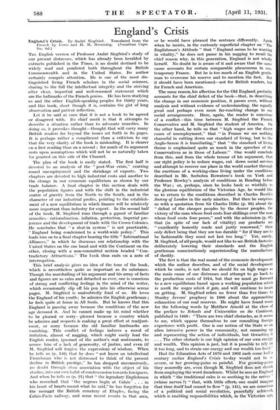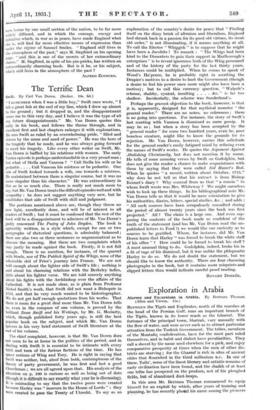England's Crisis
THE English version of Professor Andre Siegfried's study of our present distresses, which has already been heralded by extracts published in the Times, is no doubt destined to be widely read and pondered both throughout the British Commonwealth and in the United States. Its author certainly compels attention. He is one of the most dis- tinguished living French scholars in the social sciences, sharing to the full the intellectual integrity and the striving after clear, impartial and well-reasoned statement which are the hallmarks of the French genius. He has been studying us and the other English-speaking peoples for thirty years, and this book, short though it is, contains the gist of long observation and patient reflection.
Let it be said at once that it is not a book to be agreed or disagreed with. Its chief merit is that it attempts to describe a situation rather than to advocate remedies. In doing so, it provokes thought—thought that will carry many British readers far beyond the issues set forth in its pages. It is perhaps rather a compliment than a criticism to say that the very clarity of the book is misleading. It is clearer on a first reading than on a second ; for much of its argument rests upon assumptions which will not be so naturally taken for granted on this side of the Channel.
The plan of the book is easily stated. The first half is devoted to an analysis of the " post-War crisis," centring round unemployment and the shrinkage of exports. Two chapters are devoted to high industrial costs and another to the change in our economic equilibrium as shown by our trade balance. A final chapter in this section deals with the population figures and with the shift in the industrial centre of gravity from the North to the South, and in the character of our industrial profits, pointing to the establish- ment of a new equilibrium in which finance will be relatively more important than industry for export. In the second half of the book, M. Siegfried runs through a gamut of familiar remedies—rationalization, inflation, protection, imperial pre- ference and the development of trade with the Crown Colonies. He concludes that " a shut-in system " is not practicable, England being condemned to a world-wide policy." This leads him on to a final chapter bearing the title " International Alliances," in which he discusses our relationship with the United States on the one hand and with the Continent on the other, closing with a non-committal section headed " Con- tradictory Attractions." The book thus ends on a note of interrogation.
This brief analysis gives no idea of the tone of the book, which is nevertheless quite as important as its substance. Though the marshalling of his argument and his array of facts and figures are as calm and detached as ever, one is conscious of strong and conflicting feelings in the mind of the writer, which occasionally slip off his pen into his otherwise serene pages. M. Siegfried is undoubtedly fond of us. He loves the England of his youth ; he admires the English gentleman ; he feels quite at home in All Souls. But he knows that this England -is passing away because the conditions of the new age demand it. And he cannot make up his mind whether to be pleased or sorry—pleased because a country which he admires and respects is making a great effort at readjust- ment, or sorry because • the old familiar landmarks are vanishing. This conflict of feelings induces a mood of irritation, almost of nagging, which might easily lead the English reader, ignorant of the author's real sentiments, to accuse him of a lack of generosity, of justice, and even (if M. Siegfried will forgive the expression) of wisdom. When he tells us (p. 146) that he does " not know an intellectual
Frenchman who is not distressed to think of the present decline in British prestige," he has dropped unconsciously, no doubt through close association with the object of his studies, into our own habit of condescension towards foreigners. And when he tells us (p. 21) that " the legendary Englishman who remarked that ' the negroes begin at Calais ' . . . in his heart of hearts meant what he said," he has forgotten for the moment the British cemetery at Etaples, facing the Calais-Paris railway, and some recent events in that area,
or he would have phrased the sentence differently. Again when he insists, in the curiously superficial chapter on " The Englishman's Attitude " that " England seems to be wanting in vitality," he does not pause in his nagging to recall the chief reason why, in this generation, England is not wholly herself. No doubt he is aware of it and aware that the same cause accounts for certain comparable phenomena in eon. temporary France. But he is too much of an English gentle. man to overcome his reserve and to mention the fact. But it should have been mentioned—not for British readers, but for French and American.
The same reason, his affection for the Old England, probably accounts for the chief defect of the book—that, in describing the change in our economic position, it passes over, without analysis and without evidence of understanding, the equally great and perhaps even more far-reaching change in our social arrangements. Here, again, the reader is conscious of a conflict—this time between M. Siegfried the French Conservative and M. Siegfried the student of America. On the other hand, he tells us that " high wages are the direct cause of unemployment," that " in France we see nothing shameful in cutting down our standard of living, but to the Anglo-Saxon it is humiliating," that " the standard of living theme is emphasized quite as much in the speeches of the Conservatives as in those of Labour." One would conclude from this, and from the whole tenour of his argument, that our right policy is to reduce wages, cut down social service, and attempt to recover our place in the world market through the exertions of a working-class living under the conditions described in Mr. Seebohm Rowntree's book on York and Professor Bowley's analysis of conditions in Reading before the War ; or, perhaps, since he looks back so wistfully n, the glorious equilibrium of the Victorian Age, he would like us to return to the conditions described in Charles Booth', Survey of London in the early nineties. But then he surprise, us with a quotation from Sir Charles Dilke (p. 93) about the " defeat of the cheaper peoples by the dearer peoples, the victory of the man whose food costs four shillings over the man whose food costs four pence," and with the admission (p. 97) that (in spite of our lack of vitality) our products are " excellently honestly made and justly renowned," their only defect being that they are too durable " for if they are to be fashionable they must not last too long." Yet, surely, M. Siegfried, of all people, would not like to see British factories deliberately lowering their standards and the English gentleman conscientiously superintending the manufacture of shoddy.
The fact is that the real moral of the economic development which the author describes, and of the social development which he omits, is not that we should fix on high wages as the main cause of our distresses and attempt to go back to the production costs of 1914, but that we must go forward to a new equilibrium based upon a working population which is worth the wages which it gets, and will continue to insist on getting. M. Siegfried refers no fewer than five times to Stanley Jevons' prophecy in 1866 about the approaching exhaustion of our coal reserves. He might have found room for the following words by Matthew Arnold at the close of the preface to Schools and Universities on the Continent, published in 1868: "There are two chief obstacles, as it seems to me, which oppose themselves to our consulting foreign experience with profit. One is our notion of the State as an alien intrusive power in the community, not summing up and representing the action of individuals, but thwarting it . . . The other obstacle is our high opinion of our own energy and wealth. This opinion is just, but it is possible to rely on it too long, and to strain our energy and our wealth too hard."
Had the Education Acts of 1870 and 1902 each come half a century earlier England's Crisis to-day would not be sc severe, or her growing-pains so painful. For growing-pains they assuredly are, even though M. Siegfried does not shrink from employing the word decadence. Whilst he sees an England in which " the traditional calm is so soothing to the nerves ' (whose nerves ?) " that, with little effort; one could imagine that time itself had ceased to flow " (p. 141), we are conscious of a political and social revolution, peacefully achieved, which is enabling responsibilities which, in the Victorian age, were borne by one small section of the nation, to be far more widely diffused, and in which the courage, energy and initiative which, in war as in peace, have made England what she is, will find far more effective means of expression than under the regime of Samuel Smiles. " England still lives in the atmosphere of the past," says M. Siegfried on his opening page, " and this is one of the secrets of her extraordinary charm." M. Siegfried, in spite of his pin-pricks; has written an extraordinarily charming book. But is it he, or his subject, which still lives in the atmosphere of the past ?
ALFRED ZIMMERN.











































 Previous page
Previous page